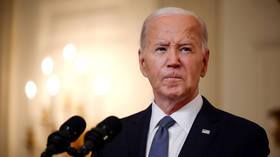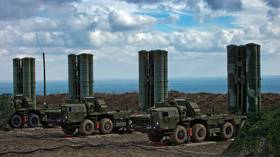US expects Israel to accept Gaza ceasefire plan

The US government is confident Israel will accept a three-phase deal for a ceasefire in Gaza if Hamas agrees, White House national security spokesman John Kirby has said.
US President Joe Biden outlined the proposal for a truce on Friday, presenting it as having come from West Jerusalem.
“This was an Israeli proposal. We have every expectation that if Hamas agrees to the proposal … then Israel would say yes,” Kirby said in an interview with ABC News’ This Week on Sunday.
The US hopes that both sides agree to launch the first phase of the plan “as soon as possible,” Kirby added. “We’re waiting for an official response from Hamas.”
Phase one would entail a six-week “pause” in the fighting, during which Israel and Hamas would “would sit down and try to negotiate what phase two could look like, and when that could begin,” said Kirby, who is the spokesman for the US National Security Council.
In addition to a full ceasefire, the first phase would include an Israeli withdrawal from populated areas of Gaza and the exchange of some hostages in Hamas captivity for Palestinian prisoners.
Phase two would see the return of all the remaining hostages who are still alive, including male Israel Defense Forces (IDF) soldiers. The remains of dead captives would be turned over in phase three, while the US and its allies launch a “major reconstruction plan” to rebuild the infrastructure in the Palestinian enclave.
Israeli PM Benjamin Netanyahu said on Saturday that there could be no permanent ceasefire until “the destruction of Hamas’ military and governing capabilities,” adding that Israel’s “conditions for ending the war have not changed.”
Two of his coalition partners, Finance Minister Bezalel Smotrich and National Security Minister Itamar Ben-Gvir, said they would quit the government if any deal was struck before Hamas was destroyed. Hanoch Milwidsky, a senior member of the Knesset for Netanyahu’s Likud Party, told the BBC on Sunday that the ceasefire plan was “completely unacceptable.”
Meanwhile, Netanyahu’s chief policy adviser Ophir Falk told The Sunday Times that the proposal Biden outlined was “not a good deal but we dearly want the hostages released, all of them.”
The US has sought to reassure Israel that Hamas has been so “degraded” that it can’t repeat the October 7 attacks, which resulted in the deaths of 1,200 Israelis and the capture of another 250. While the group is still a threat to Israel, Kirby told ABC News, “they don’t have the military capabilities to do what they did.”
The Israeli offensive against Gaza has claimed the lives of least 36,439 Palestinians and wounded 82,627 more, local health authorities said on Sunday.














